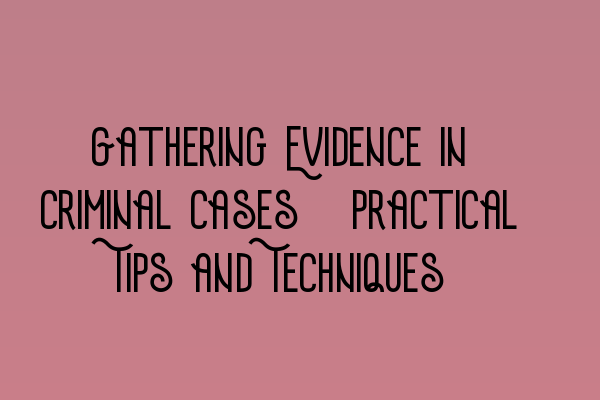Gathering Evidence in Criminal Cases: Practical Tips and Techniques
Gathering evidence is a crucial aspect of criminal cases, as it forms the foundation for proving guilt or innocence. It requires meticulous attention to detail, effective techniques, and adherence to legal processes. In this article, we will provide practical tips and techniques that will help you gather evidence effectively in criminal cases.
1. Understand the Legal Landscape
Before embarking on the evidence-gathering process, it is essential to have a comprehensive understanding of the relevant laws and regulations. Familiarize yourself with the UK Criminal Law, including the admissibility of different types of evidence and the procedures required to obtain them.
2. Create a Detailed Plan
Developing a well-structured plan is vital to ensure a systematic approach to gathering evidence. Identify the key elements of the case, determine which evidence will be most valuable, and outline the steps to obtain it. A structured plan increases efficiency and reduces the chances of missing crucial evidence.
3. Conduct Thorough Interviews and Interrogations
Interviewing witnesses and suspects is a fundamental part of collecting evidence. Prepare a list of questions in advance, ensuring they cover all relevant aspects of the case. Actively listen, take comprehensive notes, and ask follow-up questions when necessary. Additionally, consider using audio or video recordings to capture the interviews accurately.
4. Leverage Technology
With advancements in technology, digital evidence has become increasingly important in criminal cases. Utilize forensic tools and software to analyze electronic devices, such as computers, smartphones, and surveillance footage. Additionally, consider employing data recovery techniques to retrieve deleted or hidden information.
5. Document and Preserve Evidence
Properly documenting and preserving evidence is crucial to ensure its authenticity and admissibility in court. Label and package physical evidence carefully, ensuring it is protected from contamination or tampering. For digital evidence, make forensic copies and store them in a secure manner to maintain the integrity of the original data.
6. Collaborate with Experts
In complex criminal cases, it is often beneficial to collaborate with experts who can provide specialized knowledge and techniques. Consult forensic scientists, handwriting analysts, or digital forensic experts to assist in analyzing and interpreting evidence. Their expertise can uncover valuable insights that may strengthen your case.
7. Maintain Proper Chain of Custody
Establishing a strong chain of custody is essential to ensure the credibility and reliability of evidence. Maintain detailed records of who accessed the evidence, when it was obtained, and how it was handled. This documentation will demonstrate the continuity of the evidence and its integrity throughout the investigation and trial.
8. Adhere to Legal and Ethical Standards
Throughout the evidence-gathering process, it is crucial to adhere to legal and ethical standards. Ensure all investigative activities are conducted within the boundaries of the law, respecting individuals’ rights and privacy. Consider ethical guidelines, such as those outlined in the Delaware’s Code of Conduct, to maintain a high level of professionalism.
9. Continuously Review and Evaluate
Evidence gathering is an iterative process that requires continuous review and evaluation. Regularly assess the gathered evidence, identify any gaps or inconsistencies, and revise the investigative plan accordingly. Collaboration with colleagues and experts can provide valuable insights and alternative perspectives.
In conclusion, gathering evidence in criminal cases is a multifaceted process that necessitates careful planning, attention to detail, and adherence to legal and ethical standards. By following the practical tips and techniques provided in this article, you can enhance your ability to gather evidence effectively and build a strong case.
If you would like to learn more about related topics, we recommend reading the following articles:
- Legal Representation for Delaware LLCs in the UK: Expert Advice
- Ensuring Ethical Business Practices: Delaware’s Code of Conduct
- Legal Challenges for UK Businesses in the U.S.: Strategies for Overcoming Hurdles
- UK Criminal Law: An In-Depth Analysis of the British Legal System
- Legal Challenges for UK Businesses in the U.S.: Strategies for Overcoming Hurdles
